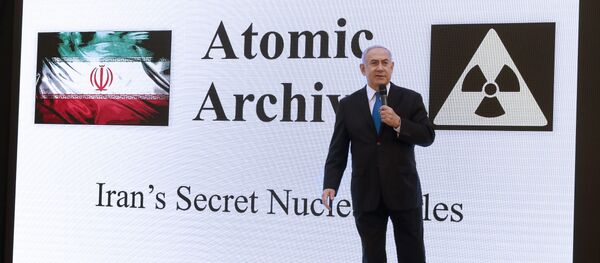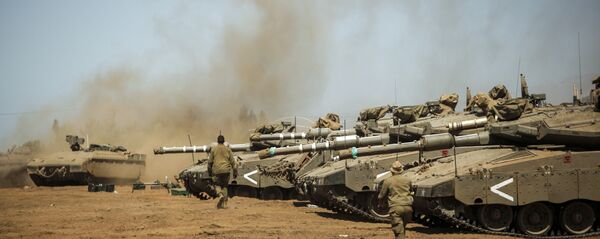Last week, Israel hit what it said were Iranian targets in Syria in response to alleged Iranian strikes against Israeli positions on Syria’s Golan Heights.
The latest escalation in the decades-long confrontation comes amid the US withdrawal from the multilateral Iranian nuclear deal, which guarantees the peaceful nature of the Iranian nuclear program, which took place after Israel had revealed what it called evidence of Tehran’s secret nuclear weapons program.
Neither Iran Nor Israel Interested in Fully-Fledged Military Conflict
"We have entered a new period in the history of Israel-Iran relations, having moved from an indirect and covert conflict to a direct and overtone. We are likely to witness further friction within the Syrian arena but also across other geographic and thematic arenas, including of course the diplomatic and economic arenas," Eran Etzion, the former deputy head of the Israeli National Security Council, told Sputnik.
The governments of both Iran and Israel have created the perception of the threat represented by each other, the expert continued.
READ MORE: Iran Says Israel Must Be Tried as 'War Criminal' in Connection With Gaza Unrest
Thus, Israeli Prime Minister Benjamin Netanyahu has built his entire political career on anti-Iranian sentiments, while Iranian leaders have been cultivating the image of Israel as the "Little Satan" having close ties to the "Great Satan," the United States, Etzion explained.
"Both parties have an interest in limited conflict. Iran is in the final stages of completing its historic ‘land bridge’ via Iraq, Syria, and Lebanon and unto the Mediterranean. It will not be deterred by Israel and is willing to engage in a direct confrontation in order to protect this strategic investment," the expert suggested.
Moreover, Iran needs Syrian President Bashar Assad to remain in power, and will continue granting military protection to the Syrian authorities in the ongoing civil war in the country.
"Israel is determined to fight against Iran’s military entrenchment in Syria, and has proven itself willing and able to damage Iranian installations," Etzion said.
The expert noted, however, that the scale of possible military escalation between Israel and Iran was still an open question.
At the same time, Iran and its regional proxies have stated they would not leave Syria anytime soon, Majidyar added.
"Iran and Israel are on a collision course in Syria. While neither Israel nor Iran wants an all-out war, heightening tension and frequent skirmishes between the two sides may result in a major escalation that could be difficult for either side to control," Majidyar said.
Israel-Iran Relations Vital for Stability in Middle East
"The Middle East is dominated by the three non-Arab regional powers – Turkey, Iran, and Israel. Relations between any two of this triad are of great importance for regional stability. In the longer run, in an era of US disengagement, Chinese global rise and Russian intricate balancing act of brazen foreign policy and a precarious domestic arena – the regional powers will most likely become the most significant factors shaping the future of the Middle East," Etzion pointed out.
The expert suggested that the tensions between the two states would remain for at least as long as their current governments remain in power.
READ MORE: Israelis 'Have Long Been Trying to Provoke Iran and its Allies' — Professor
"A real transformation in the relations will only be possible if there is a regime change in Iran, and if the Israeli government at that time recognizes an opportunity for a constructive dialogue," Etzion said.
"The US withdrawal from the Iran nuclear deal may add to the tension in Syria as the Israeli government appears to be taking a more aggressive approach to counter the Iranian threat in Syria while the Revolutionary Guards may now be less constrained to take retaliatory actions against Israel," the researcher suggested.
Etzion, in his turn, pointed out that Russia might be the best third party in dealing with both Iran and Israel to prevent them from engaging into a full-fledged conflict since Moscow is willing to protect its own interests in Syria.
Views and opinions expressed in this article are those of the contributors and do not necessarily reflect those of Sputnik.





